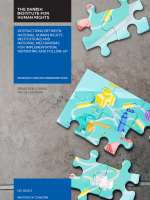
Interactions between NHRIs and NMIRFs: Research and Recommendations
Since 2016, the United Nations have strongly encouraged the creation of national mechanisms for implementation, reporting and follow-up (NMIRFs). Such governmental actors are rapidly spreading around the world, and principles on NMIRFs are being discussed. How does this new development recast ideal models for national human rights systems, and how does it impact independent national human rights institutions (NHRIs), which had since the 1990s being heralded as the ‘cornerstones’ of national human rights systems?
Based on extensive research exploring NHRIs-NMIRFs interactions in five countries (Denmark, Mauritius, Moldova, Portugal and the Republic of Korea), the present research authored by Sébastien Lorion and Rachel Murray points to major changes in local human rights implementation that may be induced by the development of NMIRFs.
This study is part of the Danish Institute for Human Rights' independent research agenda critically exploring the ‘domestic institutionalisation’ dynamics at play in the field of human rights. While the study first and foremost raises academic knowledge on the opportunities and risks arising from the development of NMIRFs, the authors go one step further and proactively make a series of recommendations that could be put forward, especially from the perspective of NHRIs, for the future normative and practical development of NMIRFs.
Matters of concern
Matters of concern is a working paper series focusing on new and emerging research on human rights across academic disciplines. It is a means for the Danish Institute of Human Rights staff, visiting fellows and external researchers to make available the preliminary results of their research, work in progress and unique research contributions.
Research papers are published under the responsibility of the author alone and do not represent the official view of the Danish Institute for Human Rights.
We strive to make the pdf versions of our publications etc. accessible for screen readers. If you experience any problems, please contact Digital Editor Stine Juhl Nielsen on stni@humanrights.dk
